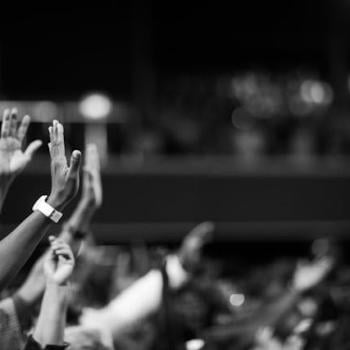 I went running this morning and it smelled like Mass. Can a mid-morning Sunday run have a Mass smell? It wasn't quite the sweet, stuck-in-my-nostrils smell of incense or the glaring scent of bleach from the squeaky-clean church hall. It wasn't quite the smell of family morning -- my mom's almond-cherry lotion or my dad's strong coffee or my sister's buzzing hair dryer. It wasn't quite the smell of fresh sun or wet ground. In the quiet of Sunday morning, knowing that all around me families were wrangling themselves out the door, hoping this is the week they don't have parade up to the front pew during the gathering song, I smelled all of that ritual.
I went running this morning and it smelled like Mass. Can a mid-morning Sunday run have a Mass smell? It wasn't quite the sweet, stuck-in-my-nostrils smell of incense or the glaring scent of bleach from the squeaky-clean church hall. It wasn't quite the smell of family morning -- my mom's almond-cherry lotion or my dad's strong coffee or my sister's buzzing hair dryer. It wasn't quite the smell of fresh sun or wet ground. In the quiet of Sunday morning, knowing that all around me families were wrangling themselves out the door, hoping this is the week they don't have parade up to the front pew during the gathering song, I smelled all of that ritual.
According to the Vatican, I haven't attended Mass regularly in years. But, lately, I've been wondering if running makes me a near-daily attendee, and quite Catholic. Running is quiet space amid the hectic, like my childhood parish was throughout my teens. Running is rhythm in my transient 20-something life; it has the familiarity I still feel walking into any Catholic church on a Sunday morning. As I have skidded into my late-twenties, I am more and more aware of the way Catholic practice plays out in sometimes funny, sometimes disconcerting, ways. Mass -- its movements, its imagination, its words, its smells -- has taken new form in my running shoes.
Young adults -- Catholic and not -- are regularly described (by ourselves and others) as "spiritual, but not religious." Throughout the month of October, this column will explore the diversity of spiritual practices -- and how young women explore them -- within Catholic practice and identity.
Sociologist Dean Hoge and others, in an often-cited study of young adult Catholics and company (Young Adult Catholics: Religion in the Culture of Choice, 2001) find "no evidence that young adult Catholics today are a generation of religious scoffers" (p. 153). My generation may be, "less religious in religious attachments than other age cohorts in the Church, [but] there is no evidence that they are any less spiritual" (p. 154). Eighty percent of non-Latinos and 77% of Latinos consider themselves "a spiritual person." A stunning 96% of non-Latinos and 99% of Latinos report praying to God (p. 154, Table 7.1).
This means that the majority of non-weekly-churchgoing young adults who call themselves Catholic, consider themselves spiritual and pray (p. 153). Further, 77% of young adult Catholics believe someone can be a "good Catholic" without going to Mass every Sunday (p. 208, Table 9.2; these data, from a Gallup poll, are not broken down into Latino and non-Latino, like the rest of the Hoge data). One direction this data pushes is to a young adult Catholic divide between Catholic religion and spirituality.
There is a deep ambivalence, if not out-and-out rejection, of the claim, "I'm spiritual, but not religious" among some older, professional Catholics. Over dinner with his nephew and his nephew's wife, Catholic theologian Dennis Doyle was confronted with two variations on this theme. His nephew, someone who strives to be a good person, no longer formally practices the Catholicism of his birthright, but really respects religiously devout people. His nephew's wife worries about staking a claim in one religion when religious pluralism in the U.S. requires appreciation for many religious worldviews.
Doyle's knee-jerk reaction was to urge them to go to Mass, to participate so that twenty-five years from now, they find value in it. He later recognized the unuseful, "Catch-22" nature of that advice and changed his tone:
When my nephew says that he is envious of people who are religious, I sense that although he stands outside a tradition and cannot see his way clear to embrace it or an alternative, at some deep level he still stands inside [the Catholic tradition], even while rejecting it. The reality is that his own heritage and identity are not simply posed there, in front of him, to be examined and then either accepted or rejected. They are also behind him, to either side of him, and within him. It is like the ocean, in which one swims, that connects the swimmer with others in that ocean. He is going to have to fight the undertow much longer if he plans to emerge completely free of it on the sandy shore. My advice instead is to find a way to, well, go with the flow. (from"Young Catholics & Their Faith: Is Being ‘Spiritual' Enough?" in Commonweal)
The Hoge study found "no evidence that Catholics or non-Catholics in our sample are turning to any non-Christian religious, Eastern spiritual movements, or New Age groups in any significant numbers" (p. 168). This suggests that while Doyle's nephew and his wife are not regularly attending Mass, they are probably not actively searching for other forms of spiritual practice outside Catholicism. Instead, they seem to be struggling to figure out how to hold both U.S. culture and Catholic identity. The question facing Doyle's nephew is not, as Doyle suggests, Why should I go to Mass when I'm not sure spirituality is there? Rather, his nephew's question seems to run a different thread: I sense that there is something spiritual ("a felt connection to something deeper") about living a good life. Can, and does, my Catholic identity affirm that?




